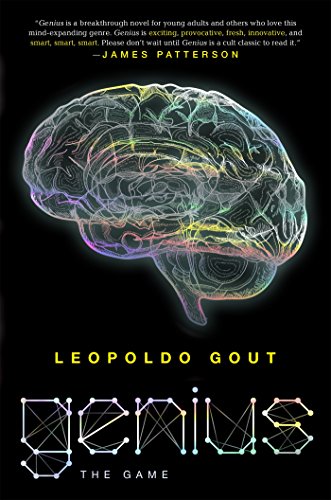All Nonfiction
- Bullying
- Books
- Academic
- Author Interviews
- Celebrity interviews
- College Articles
- College Essays
- Educator of the Year
- Heroes
- Interviews
- Memoir
- Personal Experience
- Sports
- Travel & Culture
All Opinions
- Bullying
- Current Events / Politics
- Discrimination
- Drugs / Alcohol / Smoking
- Entertainment / Celebrities
- Environment
- Love / Relationships
- Movies / Music / TV
- Pop Culture / Trends
- School / College
- Social Issues / Civics
- Spirituality / Religion
- Sports / Hobbies
All Hot Topics
- Bullying
- Community Service
- Environment
- Health
- Letters to the Editor
- Pride & Prejudice
- What Matters
- Back
Summer Guide
- Program Links
- Program Reviews
- Back
College Guide
- College Links
- College Reviews
- College Essays
- College Articles
- Back
Genius: The Game by Leopoldo Gout
Two hundred of the world’s best juvenile minds are invited to Boston to participate in the Game which will allow the winner of a series of challenges to operate their own research lab with the latest technology. Little do these kids know, the competition is not exactly as it seems, and neither are some of the participants, including the three protagonists. Cai, who lives in China, keeps her online-activist persona (Painted Wolf) secret from her parents. Her father is somehow involved with corrupt people. Tunde is an expert engineer from a rural Nigerian village who is being bribed by a military official to win and also to provide him with a GPS device. His cooperation is all that is keeping his family safe. Rex is a coding expert, and a Mexican immigrant to the US. He needs to find his missing brother, and needs an advanced computer, available in Boston, to do so. The protagonists, at the Game legitimately or not, discover the true nature of the Game, which is not exactly what it seems.
The perspective switches between Tunde, Rex, and Painted Wolf. Tunde’s perspective includes Nigerian slang and surprise towards some of the more modern, high-tech aspects of Boston life. Rex’s perspective includes some Spanish, and fear that his parents will be deported to Mexico. Painted Wolf’s perspective brings the Chinese ideas of hard work being the top priority and strict parents.
I was surprised by how believable and ordinary the characters were made to seem, although I am not familiar with some of the cultures or fields of study presented in the book, and despite their massive talents. The writing was extremely compelling because the plot moved quickly. By the end, I was familiar enough with the characters that I felt sympathy for them and wished for their successes.
The characters and their personalities, backgrounds, and interests are very diverse which means that readers will likely feel some connection to one or more of the characters. Although intended for young adult audiences, adults will value the modern-day issues discussed in the plot. Children will sympathize with some of the character’s interests.
The issues discussed in the book are at once applicable to our society today and taken to the extreme. The main issue which is revealed rather late in the story proves to be slightly outlandish, but still interesting. I was shocked when crucial plot elements were revealed, and they made me want to keep reading until the conflict was resolved and I no longer felt glued to my chair in surprise and anticipation of the storyline.
This showdown of brainpower in present-day Boston will captivate all audiences awaiting believable characters and a fast-paced plot.
Similar Articles
JOIN THE DISCUSSION
This article has 0 comments.

